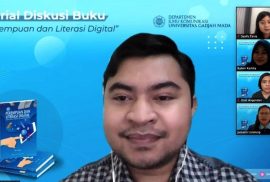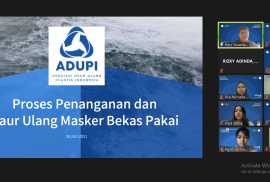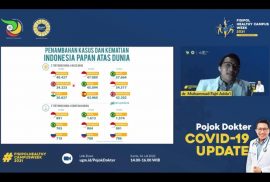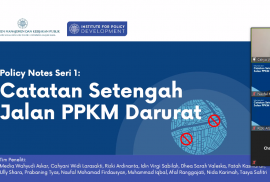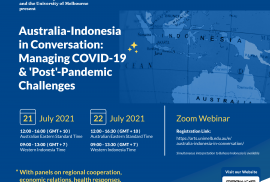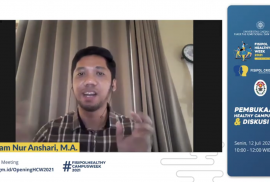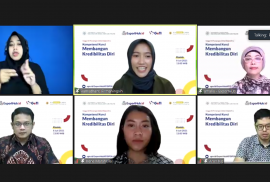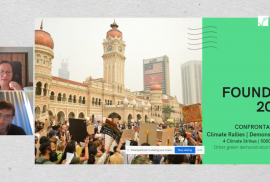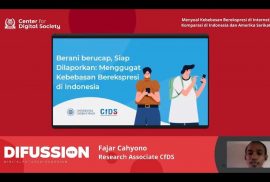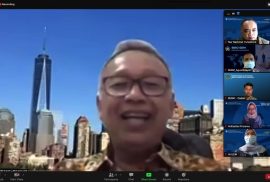Yogyakarta, July 16th 2021─The Department of Communication Science (Dikom) of UGM held the second series of Book Discussions “Women and Digital Literacy” on Friday (16/7). The topic was “Women in the Digital Revolution: Dimensions of Digital Knowledge and Competence”. On this occasion, Dikom presented the speaker Jackelin Lotulung, Lecturer of Communication Studies at Unsrat Manado and a member of JAPELIDI. Also, the three speakers as the writers are lecturers of Communication Studies UGM, they were Zainuddin Muda Z. Monggilo, Syifa Tania, and Dewa Ayu Diah Angendari. The event took place on Zoom Meeting and Live Streaming on the Youtube channel of the Department of Communication Science of UGM.
News
Yogyakarta, July 16th 2021─The Student Family of Public Policy and Management (Gamapi) of Fisipol UGM held a workshop entitled as “Young Generation: Green Campus Actor in Managing Mask Waste” in the series of Fisipol Healthy Campus Week 2021 (16/07). The workshop was attended by Hery Yusamandra, Program Manager of the Indonesian Plastic Recycling Association (ADUPI), as the speaker.
ADUPI is engaged in waste management, specifically inviting the Indonesian people to be more concerned about the management of plastic waste. Since 2015, ADUPI has not only consisted of industrial actors, but also reaches out to waste banks and collectors.
Yogyakarta, July 15th 2021─In order to enliven FISIPOL Healthy Campus Week 2021, FISIPOL UGM through the Wellness Center Team held the “Doctor’s Corner: COVID-19 Update” event on Thursday (15/7). The speaker in this event was dr. Muhammad Fajri Adda’i, Volunteer General Physician for COVID-19. Attended by lecturers, education staff, students, and the general public, the event took place via Live Streaming on Youtube channel of Fisipol UGM. Still in a separate series, free online and limited Doctor Consultations are also held.
Yogyakarta, July 15th 2021─The Institute for Development Policy (Poldev) under the auspices of the Department of Public Policy and Management (DMKP) of FISIPOL held a press conference on Thursday (15/07). This press conference is related to the dissemination of research results using Big Data entitled “Policy Notes Series 1: The Half Way Notes of Emergency PPKM”. The speakers of this dissemination were: Media Wahyudi Askar, Ph.D., the lecturer of DMKP FISIPOL; Cahyani Widi, S.IP., MDP., researcher at the Center for Capacity Development and Cooperation of FISIPOL; and Rizki Ardinata, S.IP., a researcher from the Poldev FISIPOL.
Australia and Indonesia have long enjoyed a strong, stable bilateral relationship as close neighbours in the Asia-Pacific with many shared political, economic and social interests. The COVID-19 pandemic has highlighted the considerable scope for engagement and debate between Australia and Indonesia on global and local issues of concern for both countries and for new opportunities for audiences in Indonesia to further engage with developments in Australia.
Therefore, we invite you to register for the conference Australia-Indonesia in Conversation on 21-22 July, Managing COVID-19 and ‘Post’-Pandemic Challenges, organised by Universitas Gadjah Mada in partnership with the University of Melbourne.
Yogyakarta, July 12th 2021─The Faculty of Social and Political Science (Fisipol) UGM is back with Healthy Campus Week (HCW) 2021. This time, Fisipol Crisis Center collaborates with non-governmental organization Rifka Annisa to open the HCW with a discussion called “Threading Hope (ASA): Help for Sexual Violence Survivor”.
The talk about the right steps to handle a sexual violence case was opened by a short film review created by Rifka Annisa. The 21 minute long movie was inspired by real life events with the goal that viewers can support the sexual violence survivor. Fisipol UGM Communication Studies lecturer, Irham Nur Anshari as one of the speaker in the discussion, said that the invitation to see sexual violence from the view of the victim is in line with FCC’s values. “One of the first value in the FCC guidebook is how we can use the victim’s perspective or how we handle the event with a victim-centered approach.” Irham said.
The event, which was hosted by Ramadhanti Firmaningsih from Creative Hub of Fisipol UGM, started with the presentation of material by Amalia Prabowo. As someone who has been in the advertising world for many years, Amalia said that MBKM can support students in identifying areas of interest, so that when they graduate they are ready to enter the workforce. “Find out what skills can be honed, then fight for the value,” Amalia said.
Meanwhile, Ghafran Cakra as CEO of PT Andalan Export Indonesia delivered his material about Indonesia’s potential in the world trade arena. Ghafran explained his data and experience in export-import between Indonesia and other countries. According to Ghafran, Indonesian plantation products have great potential in international trade.
Yogyakarta, 7 Juli 2021━Youths hold a great power in constructing the future of ASEAN. That is why the ASEAN Studies Center (ASC) Fisipol UGM chose to talk about the various roles of youths through ASEAN Talk: Paths to Youth Empowerment: Activism, Education, and Mobility on Wednesday (7/7). This event was held through Zoom Meeting and was live streamed through ASEANS Studies Center UGM Youtube Channel.
The first speaker in this event is Ili Nadiah Dzulfakar as the head of Klima Action Malaysia (KAMY). Nadiah said that the ASEAN society is so rich with diversity and that every state has their own problems. Each state also has their own way in responding to the pandemic. According to Nadiah, youth have a great role in the midst of this crisis.
Yogyakarta, July 2nd 2021─The Center for Digital Society or CfDS FISIPOL UGM held the DIFUSSION #54 program entitled “Questioning Freedom of Expression on the Internet: Comparison in Indonesia and the United States” on Friday (2/7). The speakers in this event were Fajar Cahyono (Research Associate of CfDS) and Alfredo (Research Intern of CfDS). The event took place via Youtube Live at 03.30 p.m. to 05.00 p.m. and was moderated by Aldo Rafi Presnauli Siregar (Partnership Associate of CfDS).
Freedom of expression is one of the basic principles of modern democracy where civil liberties deserve to be respected and considered as a prerequisite for individuals to develop themselves. Freedom of expression in the modern age has become something that is strongly fought for even today. The reason is, the problem of freedom of expression is a new problem where the moral standards for speaking and the existing legal order are different in each country. In Indonesia, we have the ITE Law (UU ITE) which regulates articles on freedom of expression on the internet. However, the law is considered to still contain several rubber articles that are used as the basis for arresting or criminalizing someone.
The Ministry of Foreign Affairs is in charge of organizing government affairs in the foreign field to assist the president in administering the state government. This career is the dream of some people, especially graduates of International Relations. It is recorded that at least 115 alumni of International Relations of UGM are working at the Ministry of Foreign Affairs to date. One of the positions in the Ministry of Foreign Affairs is in the core business division, which consists of diplomats, chandeliers, and diplomatic information institutions.

